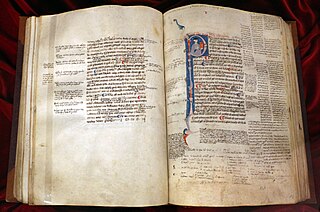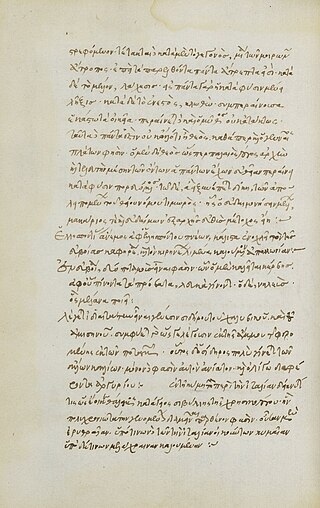
Aristotle was an Ancient Greek philosopher and polymath. His writings cover a broad range of subjects spanning the natural sciences, philosophy, linguistics, economics, politics, psychology, and the arts. As the founder of the Peripatetic school of philosophy in the Lyceum in Athens, he began the wider Aristotelian tradition that followed, which set the groundwork for the development of modern science.

The Prior Analytics is a work by Aristotle on reasoning, known as syllogistic, composed around 350 BCE. Being one of the six extant Aristotelian writings on logic and scientific method, it is part of what later Peripatetics called the Organon.

Juan Ginés de Sepúlveda was a Spanish humanist, philosopher, and theologian of the Spanish Renaissance. He is mainly known for his participation in a famous debate with Bartolomé de las Casas in Valladolid, Spain, in 1550–1551. The debate centered on the legitimacy of the conquest and colonization of America by the Spanish Empire and on the treatment of the Native Americans. The main philosophical referents of Ginés de Sepúlveda were Aristotle, Saint Thomas Aquinas, Roman law and Christian theology. These influences allowed him to argue for the cultural superiority and domination of the Spanish over the Native Americans during the period of the conquest.

The works of Aristotle, sometimes referred to by modern scholars with the Latin phrase Corpus Aristotelicum, is the collection of Aristotle's works that have survived from antiquity.

History of Animals is one of the major texts on biology by the ancient Greek philosopher Aristotle, who had studied at Plato's Academy in Athens. It was written in the fourth century BC; Aristotle died in 322 BC.
On Dreams is one of the short treatises that make up Aristotle's Parva Naturalia.
On Memory is one of the short treatises that make up Aristotle's Parva Naturalia. It is frequently published together, and read together, with Aristotle's De Anima.
On Length and Shortness of Life is a text by the Ancient Greek philosopher Aristotle and one of the Parva Naturalia.
On Divination in Sleep is a text by Aristotle in which he discusses precognitive dreams.

Sense and Sensibilia is one of the short treatises by Aristotle that make up the Parva Naturalia.
On Sleep is a text by Aristotle, one of the Parva Naturalia.

On the Soul is a major treatise written by Aristotle c. 350 BC. His discussion centres on the kinds of souls possessed by different kinds of living things, distinguished by their different operations. Thus plants have the capacity for nourishment and reproduction, the minimum that must be possessed by any kind of living organism. Lower animals have, in addition, the powers of sense-perception and self-motion (action). Humans have all these as well as intellect.

The Physics is a named text, written in ancient Greek, collated from a collection of surviving manuscripts known as the Corpus Aristotelicum, attributed to the 4th-century BC philosopher Aristotle.

Ingram Bywater, FBA was an English classical scholar.

Paul of Venice was a Catholic philosopher, theologian, logician and metaphysician of the Order of Saint Augustine.
Metaphysics is one of the principal works of Aristotle, in which he develops the doctrine that he calls First Philosophy. The work is a compilation of various texts treating abstract subjects, notably substance theory, different kinds of causation, form and matter, the existence of mathematical objects and the cosmos, which together constitute much of the branch of philosophy later known as metaphysics.
On Youth, Old Age, Life and Death, and Respiration is one of the short treatises that make up Aristotle's Parva Naturalia.

François Vatable was a French humanist scholar, a hellenist and hebraist.
Michael of Ephesus or Michael Ephesius wrote important commentaries on Aristotle, including the first full commentary on the Sophistical Refutations, which established the regular study of that text.

On Marvellous Things Heard, often called Mirabilia, is a collection of thematically arranged anecdotes formerly attributed to Aristotle. The material included in the collection mainly deals with the natural world. The work consists of 178 chapters and is an example of the paradoxography genre of literature.
This page is based on this
Wikipedia article Text is available under the
CC BY-SA 4.0 license; additional terms may apply.
Images, videos and audio are available under their respective licenses.
 Parva Naturalia public domain audiobook at LibriVox
Parva Naturalia public domain audiobook at LibriVox 








